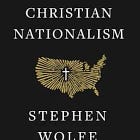The Case for Christian Nationalism
9. Liberty of Conscience | V. Conclusion
Previously:
I will stress for the last time that the central point of this chapter is an outline of principles, not a blueprint for action. This follows my principle throughout this work, that each people-group must decide for themselves how they will govern and arrange themselves.1
I do not see how this statement be taken seriously by anyone who has gotten to this point in the book. This is a good place to again list the core principles Wolfe has laid out, thus far:
An ideal government would, in a “totality of action”, prioritize nation over individual. A hierarchical structure is of inherent greater worth than egalitarian arrangements and, based on natural variances within humans, a natural aristocracy arises. From this will come “a man who can wield formal civil power to great effect and shape the public imagination by means of charisma, gravitas, and personality.” This man will need to weigh “unpleasant trade-offs” and have the “fortitude to enact and enforce the greatest good, despite unfortunate costs involved” by “shun[ning] the moralism that limits action”. This Christian Prince, by wielding the totality of action, would “restore masculine prominence in the land” and “suppress the enemies of God,” up to and including executing non-Christians who refuse to cease publicly professing their religion.2
Preferring to live with those genetically similar to you (and, downstream from that, culturally similar) is “natural and good”, not “a product of the fall”, and grace “affirms and completes it”; “much good would result in the world if we all preferred our own”, and though some intermarriage is acceptable, “blood-ties” are integral to “ethno-genesis”, and “a ‘community of blood’ is crucial to ethnicity.” The “in-group/out-group distinction” is a prelapsarian good that “preserves cultural distinctives”, and “differences in food sources, climate, and other factors” also produce, on the macro, ethnic level, a natural variance in which some groups are objectively “more beautiful, and all ways better disposed”. Recognizing this “instinct to socialize and dwell with [ethnically] similar people” is wrongly “understood as evil or pathological” by the West.3
Though the West has been multi-ethnic for generations, “perhaps in some cases amicable ethnic separation along political lines is mutually desired,” because people of different ethnic groups, including ethnically differing Christians, “cannot have a life together that goes beyond mutual alliance,” nor attain the “complete good”. To achieve this complete good, a “forcible reclamation of civil power,” also known as violent religious revolution, is justifiable, because “a Christian people share particular norms, customs, blood, etc., which are not easily forced upon them” (emphasis mine). Christians are only allowed to revolt when under “tyrannical” government, defined as a civil authority “ordering fellow men to great evil”, which, by the endorsement of revolution here and now, must include the current United States government, who are our “secularist captors”.4
There are few, if any, “principles” in Wolfe’s theory worth integrating into a genuinely Christian “blueprint for action”. His theory is more Nietzschean authoritarian ethno-nationalism than scriptural Christian political theory.
Next:
Stephen Wolfe, The Case for Christian Nationalism (Moscow, Idaho: Canon Press, 2022), 396.
Ibid., 13, 16, 31, 68, 72-73, 90, 139-40, 323, 392.
Ibid., 23, 25, 65, 67, 117-118, 142, 145.
Ibid., 149, 151, 326, 328, 334, 352.



